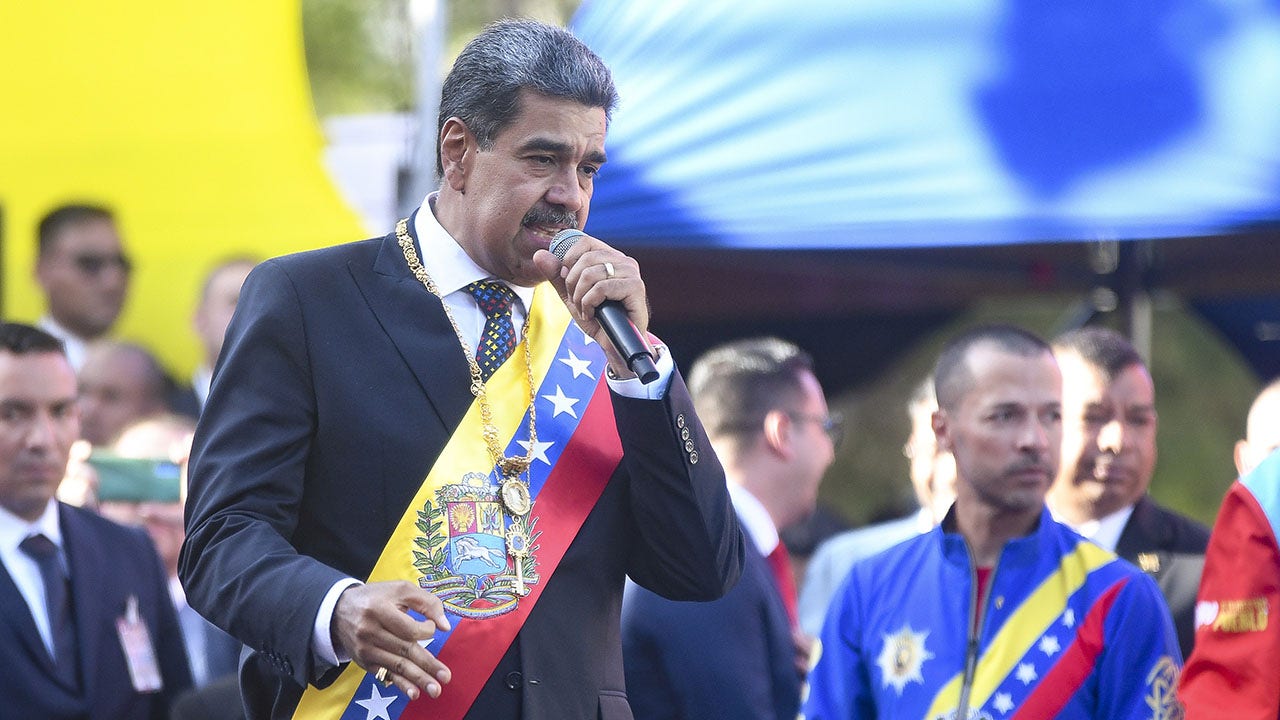Trump requested to intervene in Puerto Rico after Maduro threatened to invade the US territory.
Maduro allegedly made a threat to US national security, according to González-Colón.

The governor of Puerto Rico requested President-elect Trump to intervene after Venezuelan dictator Nicolás Maduro threatened to invade the U.S. island territory.
In a letter to Trump, Gov. Jenniffer González-Colón stated that "[J]ust a few days after holding an illegitimate swearing-in ceremony in a desperate attempt to cling to power in Venezuela," Maduro "publicly proposed an invasion of Puerto Rico."
Despite international condemnation of his recent reelection as illegitimate, Maduro, the socialist dictator, made a threat at the end of the "International Anti-Fascist Festival" hosted in Caracas. He appeared to reference Trump's remarks about U.S. control of the Panama Canal and Greenland, stating: "Just as the North has an agenda of colonization, we have an agenda of liberation." Maduro vowed that the "freedom of Puerto Rico is pending, and we will achieve it with Brazilian troops," according to Latin America Reports.
"González-Colón informed Trump that the threat to the United States, our national security, and stability in the region is an open one, and he trusts that the incoming administration will swiftly respond and make it clear to the Maduro regime that under their leadership, the United States will protect American lives and sovereignty and will not bow down to the threats of petty, murderous dictators."

Since taking office, González-Colón has emphasized that Puerto Rico has been a vital part of the United States since 1898 and that Puerto Ricans were granted American citizenship in 1917. She highlighted the significant contributions made by Puerto Ricans to American life, including the hundreds of thousands of service members from the Island who have fought alongside fellow citizens in every U.S. military conflict since World War I.
Despite Maduro and other opponents' calls for independence, Puerto Rico's people have consistently rejected this option. Instead, they have chosen to strengthen their relationship with the United States through statehood, as demonstrated in the November 5, 2024, plebiscite held alongside the general elections, according to González-Colón.
Meanwhile, 30.84% voted for independence, while 12.29% opted for "free association with the United States." The results showed 56.87% voted in favor of U.S. statehood.
The referendum ballot did not include the option of retaining the island's current status as a U.S. territory, as well as U.S. citizenship.
González-Colón, a Republican and member of the pro-statehood New Progressive Party, emphasized that Puerto Rico is home to Fort Buchanan, the only U.S. Army installation in the Caribbean, and National Guard facilities such as Camp Santiago, Fort Allen, and Muniz Air National Guard Base. These facilities strategically support exercises and operations conducted by the U.S. military and its partners. The letter also highlighted that Puerto Rico hosts critical U.S. Coast Guard and U.S. Customs and Border Protection assets and units that help secure our borders and combat the drug trafficking networks that fund the Maduro narco-regime.

In Puerto Rico, the United States shares a maritime boundary with Venezuela.
"González-Colón wrote that Maduro's calls for an invasion are an attempt to remove the US presence and increase his influence in the region. She told Trump that she is ready to work with his administration to counter this threat and support the people of Venezuela in their fight for freedom."
SULLIVAN SAYS BIDEN ADMIN HAS LESSENED THREATS FROM RUSSIA, CHINA AND IRAN, MAKING AMERICA SAFER AFTER TRUMP LEAVES OFFICE.
Rep. Mario Rafael Díaz-Balart, R-Fla., praised González-Colón's "condemnation of the absurd and pathetic threats to Puerto Rico from Venezuela's dictator, who is desperately clinging to illegitimate power."

""With Biden in the White House, adversaries such as those within the Maduro narco-dictatorship have been emboldened by his weak policy of appeasement. But in less than a week, a new foreign policy will begin where freedom and U.S. national security interests are paramount. Friends will be treated as friends, and adversaries as adversaries. If the dictator in Venezuela does not want to end up like other dictators Mussolini and Gaddafi, he should leave Venezuela without delay," Díaz-Balart wrote."
Biden explained his choice not to intensify sanctions on Venezuela's energy industry during Maduro's inauguration, citing concern that it might provide an opportunity for Iran to enter the market.
Although the administration imposed sanctions on several Maduro officials, it did not revoke the license it granted to oil giant Chevron to export Venezuelan oil to the U.S. This license has significantly increased oil production and state revenues. The Associated Press contributed to this report.
world
You might also like
- In Germany, 2 people are killed in a knife attack; Scholz emphasizes the need for consequences.
- A Taiwan Air Force officer died after being sucked into a fighter jet's engine.
- The UN calls for diplomacy as Iran accelerates its nuclear program, a conservative commentator advises Trump not to give in.
- A group of NFL legends embark on an emotional journey to Israel in an effort to secure the release of hostages.
- Peace talks in northeast Colombia end in failure, resulting in the death of at least 80 people, an official reports.



















